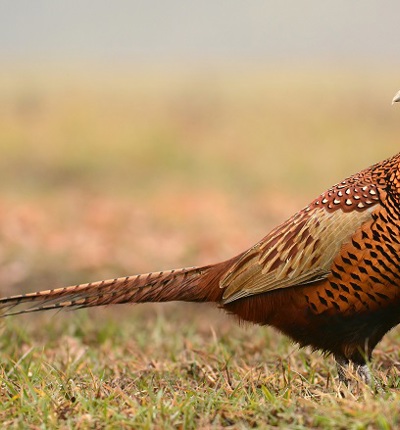
Wild Justice challenges failure to assess impact of gamebird introductions
Environmental NGO Wild Justice are challenging the government's failure to put in place a process to trigger an assessment of the impact of releasing game birds on wildlife sites.
Posted on 18 July 2019
What is blindingly obvious to anyone with even a basic understanding of natural sciences is that dumping at least 50 million non-native birds into the UK countryside will have a profound effect on its ecology – it’s about time we measured what that effect is."
Chris Packham, naturalist and director of Wild Justice
Leigh Day has today sent a Pre-Action Protocol letter on behalf of Wild Justice to the Department of Environment, Food and Rural Affairs (DEFRA).
Wild Justice argue in their letter that the UK government is failing to properly comply with a key provision in Article 6 of the Habitats Directive, which concerns the potential impact on sites protected under EU law.
Every year some 43 million pheasants and 9 million red-legged partridge are released into the countryside in preparation for the shooting season. Together with the residual population of pheasants, at their peak these birds represent half the total bird biomass in the UK.
The pheasant is not native to the UK but about half of the European breeding population is found in the country because of the scale of annual release of captive-reared birds.
Studies have shown that the introduction, management and shooting of gamebirds are likely to have a range of impacts on the UK’s native wildlife and the environment. Once released from their pens, pheasants eat a wide variety of plants, insects, molluscs, reptiles and even small birds and mammals. Dead pheasants represent 33,000 tonnes of meat in the countryside, which is likely to maintain high numbers of predators such as carrion crows and foxes. Also, around 5,100 tonnes of lead shot is deposited annually into the UK’s environment, about 20% of which is contributed by pheasant shooting. This shot is largely un-retrieved, but can be eaten by other wildlife, including protected birds of prey.
Wild Justice is arguing that the introduction of gamebirds onto shooting estates constitutes a ‘plan’ or ‘project’ under EU and UK law and therefore the impact on Special Protection Areas for birds (SPAs) and/or Special Areas of Conservation (SACs) should be thoroughly evaluated.
Wild Justice is fundraising for the case through CrowdJustice.
Carol Day, solicitor at Leigh Day said:
“The aim of the law is to ensure that plans and projects that could have a significant adverse effect on important wildlife sites are properly evaluated before permission is given to carry out them out. Our client is arguing that the scale of gamebird releases and the potential impact on the UK’s most important wildlife sites is such that a process for assessment must now be provided.”
Chris Packham, a director of Wild Justice, said:
"The UK’s shooting industry is one of the least regulated in Europe with no centralised collection of any data. No one knows how many birds are released or shot, whether wild or captive bred. So how on earth can that shooting industry claim to be making informed decisions about sustainable harvesting, stocking or conservation? What is blindingly obvious to anyone with even a basic understanding of natural sciences is that dumping at least 50 million non-native birds into the UK countryside will have a profound effect on its ecology – it’s about time we measured what that effect is."
Ruth Tingay, a director of Wild Justice, said:
"It's worth noting that the 50+ million figure is only a guesstimate, made by the shooting industry six years ago. For all we know there could be 100 million Pheasants and Red-legged Partridges being let loose in the countryside every year. The fact that the Government doesn't know or care how many are released, and its previous refusal to assess the extent of the environmental damage caused, will come as no surprise to conservationists who have watched this Government put vested interests ahead of wildlife conservation time and time and time again."
Mark Avery, a director of Wild Justice, said:
"Let’s take a step back: if we had never seen a Pheasant or Red-legged Partridge in the countryside and someone suggested releasing over 50 million of these omnivorous non-native gamebirds annually would we just nod it through with no concerns? No! It’s only because this situation has crept up on us through lack of regulatory control that we are in this position. Government has been lax and now Michael Gove must act."
Defra has until 31 July 2019 to respond to the PAP letter, after which WJ will consider whether to commence legal proceedings.
For more information please contact Caroline Ivison on 07775 713725 or email pressoffice@leighday.co.uk

